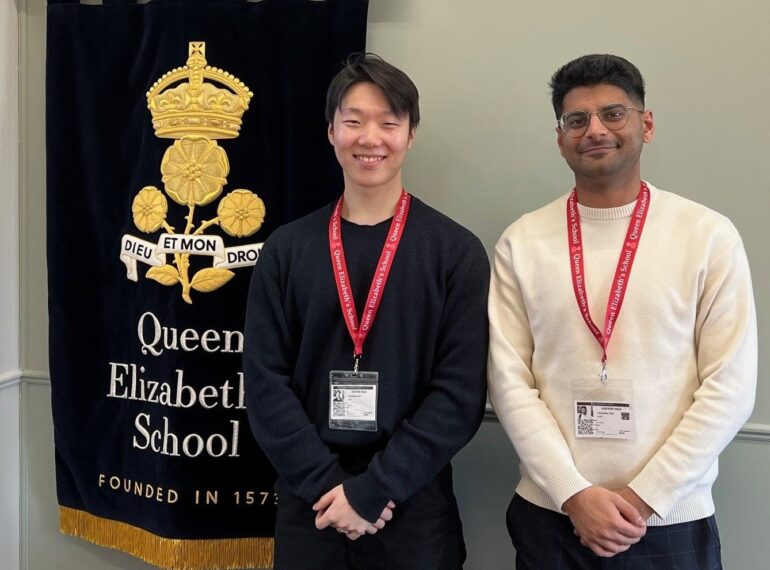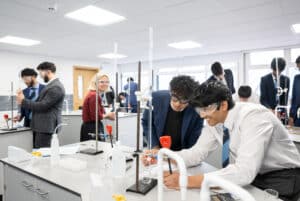
Two Old Elizabethan medics are working with the School to trial an innovative education app that uses AI to support both pupils and their teachers.
QE contemporaries Kavi Samra and Paul Jung (both 2008–2015) have developed Medly AI to help pupils from backgrounds like theirs who may not have access to all the educational resources available to others.
 They only started working on the business in August, yet already it has won funding and been accepted into Microsoft’s start-up programme.
They only started working on the business in August, yet already it has won funding and been accepted into Microsoft’s start-up programme.
Headmaster Neil Enright said: “We are very pleased to be working with Kavi and Paul as they develop this exciting venture that is showing great potential to support our boys, and other young people, with their consolidation and revision.”
After approaching the School about trialling the app with QE pupils, the pair had a meeting with the Headmaster and with Gillian Ridge and Amy Irvine, Heads of Biology and Chemistry respectively, in which they demonstrated the platform and introduced its teacher mode. “This is where teachers are able to set questions (from a large database, or their own custom questions) to their respective classes for homework, or in a test format,” said Kavi.
Medley AI can then:
- Understand the questions
- Work out how they fit into the curriculum of the subject
- Assign them to a specification point
- Mark the students’ answers.
“From here, the teacher can get in-depth statistical insights into each student’s weak topics, topic by topic and class by class. This then enables them to customise their classroom teaching according to class-wide weak topics and, of course, saves an incredible amount of time in terms of marking student work.
 “Both Dr Irvine and Dr Ridge seemed quite impressed and were eager to start using Medly as a resource to save time and understand where their students don’t perform well.”
“Both Dr Irvine and Dr Ridge seemed quite impressed and were eager to start using Medly as a resource to save time and understand where their students don’t perform well.”
‘Onboarding’ for the Year 11 group took place before Christmas, and Paul and Kavi will now be working with the Science department. “This will involve teachers setting homework on the platform and providing feedback on what they’d like to see in our teacher mode to help us improve the platform,” said Kavi. “The students will, of course, have access to our base platform, too, in case they wish to do additional learning or practise questions or exams.”
“We’ve always wanted to try to democratise education,” says Kavi. “Medly AI was born from the vision of making quality education accessible and personalised through the power of AI. Both Paul and I noticed throughout our education how people often had advantages from their socio-economic background in terms of educational resources (e.g personal tuition): both of us come from backgrounds that didn’t allow us access to these resources.
“Recognising the gaps in traditional educational systems due to work pressures on teachers and staffing issues, we saw the potential of AI to fill these gaps and therefore conceptualised a platform that could act as a personal tutor, examiner, and classroom assistant, all integrated into one user-friendly interface.”
Paul is responsible for writing code and working on the technical side of the project, while Kavi takes on operations.
After just two months of development, Microsoft admitted Medly AI to its programme, providing Kavi and Paul with mentoring from a business development manager and meeting the costs of the platform up to £150,000. A month later, the project was also accepted into UCL’s Hatchery start-up accelerator, enabling its professional fees for legal, IP and accounting costs to be funded.
Both Paul and Kavi have deep connections with UCL. Paul holds a PhD in Neuropsychiatry from the university, and has an extensive background in coding and teaching. He included AI in his research, on which he has published and given international presentations. He has returned to his medical degree at UCL and is in his final year, completing his MBBS in August.
Kavi, who currently works as a doctor in anaesthetics, completed his medical degree at UCL in 2021 and is a clinical teacher within its medical school: his approaches to using teaching theory in a digital age earned him an Associate Fellowship of Higher Education Award from UCL and he is also one of the youngest recipients of an honorary fellow contract at UCL.
